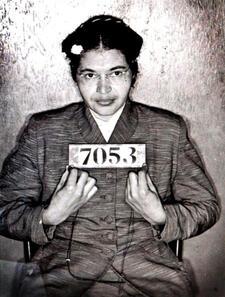Rosa Parks and Hanukkah: Why Ignorance Isn't Always Bliss
On the Thursday night before Hanukkah began, I attended an event called A Sip of Eser, an introductory session to the ten-part young adult learning program Eser (meaning 10) run by Hebrew College in nearby Newton, MA. Amidst the tumult of a Boston bar, and alongside several dozen people I had never met, I heard rabbinical student, Seth Wax, tell a Hanukkah story none of us had ever heard.
In Hebrew school we learned that Antiochus—an evil king—banned Jews from practicing their religion, defiled the Temple, and generally made life terrible for the Jews. Then, the Maccabees, led by Judah, valiantly waged war on their oppressors and won, miraculously reclaiming the Temple and keeping the lamp lit for eight nights.
The story that Seth told us, one that was also told by David Brooks in a 2009 New York Times column, went a little differently. In this version, the Jews were living quite happily, reaping the benefits of living in the strong, culturally rich, and reason-driven empire created by Alexander the Great. For the most part, the Hellenist rulers respected local religions languages and traditions.
However, in the Seleucid Dynasty, a crazy and evil king, Antiochus—turns out the story I learned as a kid got that part right—began to oppress the Jews, outlawing Jewish practices on penalty of death. A small, radical faction of rebels began to form. One day, one of them—Judah's father Mattathias—saw a Jew making a sacrifice at a Greek altar; he flew into a rage, killing the man. This is the event that sparked the Maccabean revolt: a Jew killing another Jew. From there, the story continues as you probably know it until the Maccabees win the war.
But there’s more: I also never learned that after their victory, the Maccabees (as Brooks writes) "became religious oppressors themselves," even performing forced circumcisions on Jews who were uncircumcised. Under Maccabean rule, Brooks asserts, "practice stagnated" and "scholarship withered."
It's pretty clear to me why we were never taught this story as kids. It certainly doesn't make the Jews look good, and it complicates the narrative in an uncomfortable way. Educators who want students to love Judaism or parents who struggle with their own Jewish beliefs may have a difficult time trying to explain the full story to children (especially when other families are celebrating Christmas).
However, the story raises a lot of important questions that I have struggled with on my own Jewish journey: How should Jews negotiate the balance between religious and cultural continuity and embracing and accepting diversity? What does it mean to be Jewish? Who decides who is Jewish, or who isn’t Jewish enough? How do I live peaceably with neighbors who have beliefs that are radically different from my own? I can’t help feeling that Hanukkah represents a real missed opportunity for American Jews.
I said good-bye to my new friends and left the bar wondering how I had never heard this side of the Hanukkah story before. As I waited for the bus, I thumbed through my Facebook newsfeed on my phone and, suddenly a headline caught my eye: It's Time to Free Rosa Parks from the Bus. This article by historian Danielle McGuire discusses an essay written by Rosa Parks that was only made public last year. In it, Parks describes a "near-rape" by a white man. While some people have claimed it is a work of fiction and others say that it is “semi-autobiographical,” McGuire asserts that it is in fact a personal account that sheds light on the true Rosa Parks—not the grossly simplified character we learned about in school during Black History Month.
While Parks certainly played an important role in igniting the civil rights struggles of the 1950s and 1960s, she worked as an activist for years before (and after) that fateful bus ride in Montgomery. She was involved in the defense of the Scottsboro Boys and was a key investigator in the Recy Taylor case. She served as an NAACP secretary, collecting affidavits from victims of racism and sexism. In the years following the bus boycott, McGuire writes, Parks “fought for open housing and against police brutality, railed against the war in Vietnam, and campaigned for George McGovern.”
If you like this post, check out:
As McGuire sees it, Parks has been "imprisoned" by the story we all know about a "quiet but courageous woman, whose humble righteousness shamed America into doing what was right." Instead, McGuire argues, that this essay (lost for years and questioned as a fake when it was found) contextualizes Parks’ true legacy as a militant activist committed to a lifelong "resistance to the inhumanity of racism and sexism."
I understand why this more complicated narrative of Rosa Parks’ life, like the untold story of Hanukkah, may be difficult to teach. I understand why it is easier to remember the Civil Rights Movement as a series of high profile sit-ins and boycotts, rather than to recognize the darker, more intimate struggles of individual men and women. But to what end and at what cost?
Hilary Leila Krieger touched on this duality in her recent New York Times Op-Ed piece about the true meaning of Hanukkah, writing, “While elevating Hanukkah does a lot of good for children’s morale, ignoring or sanitizing its historical basis does a great disservice to the Jewish past and present.”
It is important to celebrate history, to commemorate the battles large and small, ancient and recent that we have waged and won. But children grow into adults, and those adults become parents. Over time, the stories we tell one another become our history. As teachers, as parents, as older siblings or as camp counselors, we must strive to pass on stories that are deep, complex, and difficult. These are the stories that exemplify our true human experience. These tales allow us to connect to real people, rather than to passively observe them as characters in a far-away time or place. These stories—the story of Hanukkah rooted in Jewish religious extremism and of a civil rights hero’s lifelong dedication to victims of sexual violence—challenge us to see ourselves as players in history and as links in a long, complicated legacy.








I, too, heard this unflattering side of the Chanukah story this year, told by our far to the Left rabbi. He always seems to find a way to bash the Jews and/or Israel in some way, so I tend to take his "teachings" with a grain of salt. It may be true that some of the Hasmoneans were rather zealot in their desire to ensure the survival of Judaism and ritual practices, but it is also true that under Antiochus, Jews were not allowed to study or practice their religion. Circumcision was banned as were all other Jewish practices. The Greek/Roman culture, with its emphasis on brawn and beauty, not study and ritual, were enticing. The fear of being put to death for not bowing down to the statues of Zeus or other Greek idols was real. It makes sense that some Jews of that time ( as in ours) would opt to forsake their heritage and religious life, for the sake of their personal well-being and survival. And it also makes sense that some Jews might respond to harshly to these kinsmen. Still, the story and miracles of Chanukah stand true and I, for one, am very wary of those who try to retell our story, after over 2000 years.
Excellent article. Thank you. In researching my novels, Noah's Wife and Lot's Wife, I had several moments like the one described here of shock at the juxtaposition of what I had been taught about the beginnings of Judaism and what archeology is revealing about the true roots of the major world religions. Similar to that simplified picture of Rosa Parks, our beginnings were not the God-to-Abraham: "I am one; start the Jewish people" that we were taught in Sunday School. Facing this and facing the fact that Jewish extremism is just as ugly as any other, is hard and against our core desires about how we see ourselves, but I agree with the author. If we face the truth, it will set us free. http://www.tkthorne.com
In reply to <p>Excellent article. Thank by TKThorne
This is an excellent story. It brought to mind my life and the stories I was told growing up; the stories (or should I say) the lessons that I was taught. I was raised Catholic; very, very Catholic. My parents and the Catholic Schools that I attended, taught me to believe things like purity, truth and honesty; giving, loving and caring were the most important things in life. I was taught that you go to church, you get an education, you work hard, you meet boy, you fall in love and you get married. You then buy a house, have children and raise a nice little catholic family. If I just do all of these little things I will ALWAYS be happy and live a wonderful life. Well, what I was not told is this: my grandparents on one side were never married and that my grandfather had seven other children with his wife. My grandparents on the other side were also playing around, just as their parents before them. In addition, just like most of the rest of the world, I was told to be a good little girl and Santa would bring me toys. The only question I had about that was this, how was he going to do that? We had no chimney. Nevertheless, I believed and I always got my presents. Now, I ask myself, how much damage was done? Well, as I think about each story, I believe it was told out of love. Each teaching was given out of love. I didn't know my grandparents weren't married until my grandmother's death noticed appeared in the Times Picayune three days after her death. Was I harmed by this? I don't think so. All the stories and teachings were done to make me a happy or a better person. I have never felt bad or less loved because of any of it. I believe today, that we were taught from our parents experiences. I believe that all parents want the best for their children. I KNOW that my very loving, hardworking, uneducated and financially poor parents were rich in love and gave and gave and gave so that their children could be happy. My pains as a child and as an adult were and are the pains from racism, classism and sexism. The pains from the lies told by my Federal, State and Local Leaders are the lies, stories or teachings told, not out of love, but out of greed, power, control and hatred. Rosa Parks lived her life as most African Americans live theirs. She fought for her rights (and others rights). She worked hard and she loved hard. While there were many unfortunate and unnecessary experiences in her life, IÌ¢âÂã¢m sure she met a lot of good people, great fighters and good leaders. I believe, however that many of her painful experiences occasionally lead her into joyful and loving arms. She was indeed a Special Lady. And, unlike those who learned about her each February, we, African Americans, never had to be taught that Mrs. Parks was not just a little lady who just got tired of being pushed around one day, we knew there had to be more because of our own personal voyages.
As chance or good fortune favors the prepared mind, symbolic leadership favors the prepared activist. It should be more widely known that Rosa Parks was not a passive bystander, chosen by chance to become the catalyst for the civil rights movement. She was prepared by her solid personal history of civil rights beliefs and actions. When the bus incident occurred, she was ready to spark it into the flame that grew.